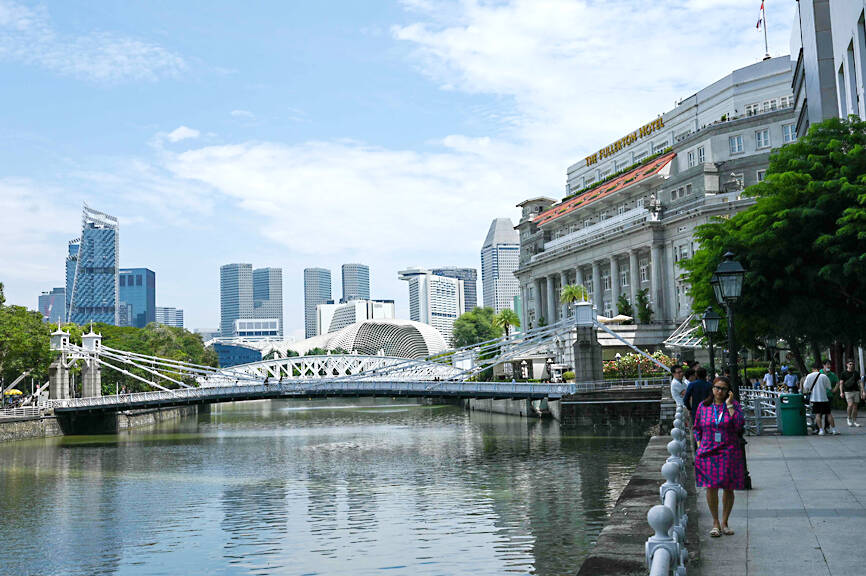Singapore’s economy avoided a recession and expanded 1.2 percent last year, Singaporean Prime Minister Lee Hsien Loong (李顯龍) said on Sunday, while warning that geopolitical risks would weigh on next year’s growth.
The city-state’s economic performance is often seen as a barometer of the global environment because of its reliance on international trade.
“We made 1.2 percent growth this year, avoiding a recession,” Lee said in his New Year’s message.

Photo: AFP
For this year, growth is projected to come in at 1 to 3 percent, “but much will depend on the external environment,” he said, pointing to the continuing war in Ukraine and Israel’s conflict with Hamas.
The economy has been hurt by softer global demand for its exports, with the return of air travel after the COVID-19 pandemic boosting domestic growth.
“For some years to come, we must expect the external environment to be less favorable to our security and prosperity. Geopolitical uncertainties will continue weighing on the global economy,” Lee said.
“In our own region, there are tensions and risks over rival claims in the South China Sea, and because of the cross-Strait situation. These can affect confidence in the region, and hence our growth.”
Maritime tensions have risen in the sea after China and the Philippines traded blame for a series of incidents in the area, including a collision between their vessels.
Lee also cited climate change as another challenge for the low-lying island-state.
“We are already feeling its effects,” he said. “Singapore needs to adapt to and prepare for rising temperatures and sea levels, and to transition our economy to net zero carbon emissions. It will be costly and demanding.”
Lee, who has been prime minister since 2004, called for unity as he prepares to hand over leadership this year to Singaporean Deputy Prime Minister Lawrence Wong (黃循財), who is also the finance minister.
“This is not the first time we are having a leadership transition, but transitions are always delicate,” Lee said, adding that Singapore “will come under close scrutiny” on whether it “can remain successful and exceptional.”

Taiwan’s technology protection rules prohibits Taiwan Semiconductor Manufacturing Co (TSMC, 台積電) from producing 2-nanometer chips abroad, so the company must keep its most cutting-edge technology at home, Minister of Economic Affairs J.W. Kuo (郭智輝) said yesterday. Kuo made the remarks in response to concerns that TSMC might be forced to produce advanced 2-nanometer chips at its fabs in Arizona ahead of schedule after former US president Donald Trump was re-elected as the next US president on Tuesday. “Since Taiwan has related regulations to protect its own technologies, TSMC cannot produce 2-nanometer chips overseas currently,” Kuo said at a meeting of the legislature’s

TECH WAR CONTINUES: The suspension of TSMC AI chips and GPUs would be a heavy blow to China’s chip designers and would affect its competitive edge Taiwan Semiconductor Manufacturing Co (TSMC, 台積電), the world’s biggest contract chipmaker, is reportedly to halt supply of artificial intelligence (AI) chips and graphics processing units (GPUs) made on 7-nanometer or more advanced process technologies from next week in order to comply with US Department of Commerce rules. TSMC has sent e-mails to its Chinese AI customers, informing them about the suspension starting on Monday, Chinese online news outlet Ijiwei.com (愛集微) reported yesterday. The US Department of Commerce has not formally unveiled further semiconductor measures against China yet. “TSMC does not comment on market rumors. TSMC is a law-abiding company and we are

FLEXIBLE: Taiwan can develop its own ground station equipment, and has highly competitive manufacturers and suppliers with diversified production, the MOEA said The Ministry of Economic Affairs (MOEA) yesterday disputed reports that suppliers to US-based Space Exploration Technologies Corp (SpaceX) had been asked to move production out of Taiwan. Reuters had reported on Tuesday last week that Elon Musk-owned SpaceX had asked their manufacturers to produce outside of Taiwan given geopolitical risks and that at least one Taiwanese supplier had been pushed to relocate production to Vietnam. SpaceX’s requests place a renewed focus on the contentious relationship Musk has had with Taiwan, especially after he said last year that Taiwan is an “integral part” of China, sparking sharp criticism from Taiwanese authorities. The ministry said

US President Joe Biden’s administration is racing to complete CHIPS and Science Act agreements with companies such as Intel Corp and Samsung Electronics Co, aiming to shore up one of its signature initiatives before US president-elect Donald Trump enters the White House. The US Department of Commerce has allocated more than 90 percent of the US$39 billion in grants under the act, a landmark law enacted in 2022 designed to rebuild the domestic chip industry. However, the agency has only announced one binding agreement so far. The next two months would prove critical for more than 20 companies still in the process